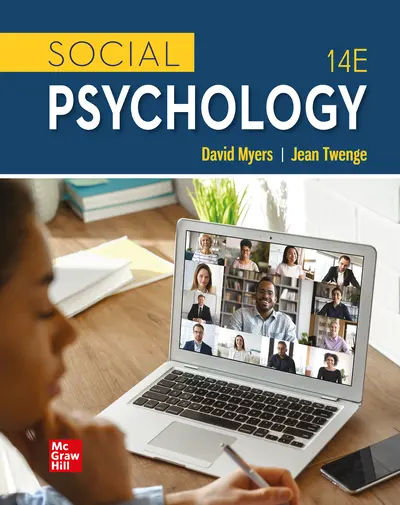My Account Details

ISBN10: 1260888533 | ISBN13: 9781260888539

Social Psychology
Product not yet available for student view. Change to an older release to view student options.
- Lowest Price!
McGraw Hill eBook
Textbook Rental (150 Days Access)
- Rent for a fraction of the printed textbook price
- Complete text bound in hardcover or softcover
Loose-Leaf Purchase
Unbound loose-leaf version of full text
Shipping Options
- Standard
- Next-day air
- 2nd-day air
Orders within the United States are shipped via FedEx or UPS Ground. For shipments to locations outside of the U.S., only standard shipping is available. All shipping options assume the product is available and that processing an order takes 24 to 48 hours prior to shipping.
Note: Connect can only be used if assigned by your instructor.
Connect (180 Days Access)
- Digital access to a comprehensive online learning platform
- Includes homework, study tools, eBook, and adaptive assignments
- Download the free ReadAnywhere app to access the eBook offline
McGraw Hill GO (180 Days Access)
- Digital access to eBook+ embedded in your school's Learning Management System (LMS)
- Includes full eBook and chapter questions
- Download the free ReadAnywhere app for offline and mobile access
McGraw Hill eBook
Details:
- Normally the lowest price option for student
- Integrates in your LMS
- Accessible tools for students, including read-aloud functionality, jump links and dynamic note-taking and highlighting features
Textbook Rental (150 Days Access)
Details:
- Rentable option
- Hardcopy and softcover formats
Loose-Leaf Purchase
Details:
- Unbound loose-leaf version of full text
Connect (180 Days Access)
Details:
- Integrates in your LMS
- Prebuilt courses, presentation slides and instructor resources
- Test question banks, adaptive assignments, essay prompts, video content and more interactive exercises specific to your course subject
- eBook access (with included ReadAnywhere app)
- Print book add-on availability
- Remote proctoring
McGraw Hill GO (180 Days Access)
Details:
- Integrates in your LMS
- Assignable readings
- Auto-graded chapter questions
* The estimated amount of time this product will be on the market is based on a number of factors, including faculty input to instructional design and the prior revision cycle and updates to academic research-which typically results in a revision cycle ranging from every two to four years for this product. Pricing subject to change at any time.
Connecting Social Psychology to the world around us. Social Psychology introduces students to the science of us: our thoughts, feelings, and behaviors in a changing world. Students learn to think critically about everyday behaviors and gain an appreciation for the world around us, regardless of background or major. Social Psychology’s conversational voice allows students to access and enjoy this exciting science. Students find scientific explorations of love, hate, conformity and independence, prejudice and helping, persuasion and self-determination.
Part One Social Thinking
Chapter 2 The Self in a Social World
Chapter 3 Social Beliefs and Judgments
Chapter 4 Behavior and Attitudes
Part Two Social Influence
Chapter 5 Genes, Culture, and Gender
Chapter 6 Conformity and Obedience
Chapter 7 Persuasion
Chapter 8 Group Influence
Part Three Social Relations
Chapter 9 Prejudice
Chapter 10 Aggression
Chapter 11 Attraction and Intimacy
Chapter 12 Helping
Chapter 13 Conflict and Peacemaking
Part Four Applying Social Psychology
Chapter 14 Social Psychology in the Clinic
Chapter 15 Social Psychology in Court
Chapter 16 Social Psychology and the Sustainable Future
About the Author
David Myers
David Myers is the John Dirk Werkman Professor of Psychology at Hope College where he has taught for the past 30 years. David Myers' love of teaching psychology has been rewarded by students on many occasions with numerous “Outstanding Professor” awards. An award-winning researcher, Dr. Myers received the Gordon Allport Prize from Division 9 of the American Psychological Association for his work on group polarization. His scientific articles have appeared in more than two dozen journals, including Science, American Scientist, Psychological Bulletin, and Psychological Science. He has served his discipline as consulting editor to the Journal of Experimental Social Psychology and the Journal of Personality and Social Psychology.
Jean Twenge
As Professor of Psychology at San Diego State University, Jean M. Twenge has authored more than 120 scientific publications on generational differences, cultural change, social rejection, gender roles, self-esteem, and narcissism. Her research has been covered in Time, Newsweek, The New York Times, USA Today, U.S. News and World Report, and The Washington Post, and she has been featured on Today, Good Morning America, CBS This Morning, Fox and Friends, NBC Nightly News, Dateline NBC, and National Public Radio.
She summarized this research for a broader audience in the books Generation Me: Why Today's Young Americans Are More Confident, Assertive, Entitled- and More Miserable Than Ever Before and The Narcissism Epidemic: Living in the Age of Entitlement (co-authored with W. Keith Campbell). She has written for general audiences on several websites and magazines, including a piece for The Atlantic that was nominated for a National Magazine Award. She frequently gives talks and seminars on generational differences to audiences such as college faculty and staff, military personnel, camp directors, and corporate executives.
Dr. Twenge grew up in Minnesota and Texas. She holds a B.A. and M.A. from the University of Chicago and a Ph.D. from the University of Michigan. She completed a postdoctoral research fellowship in social psychology at Case Western Reserve University. She lives in San Diego with her husband and three daughters.
Accessibility
Creating accessible products is a priority for McGraw Hill. We make accessibility and adhering to WCAG AA guidelines a part of our day-to-day development efforts and product roadmaps.
For more information, visit our accessibility page, or contact us at accessibility@mheducation.com
Affordability
Reduce course material costs for your students while still providing full access to everything they need to be successful. It isn't too good to be true - it's Inclusive Access.
Need support? We're here to help - Get real-world support and resources every step of the way.